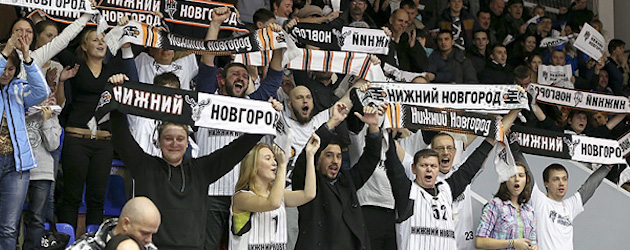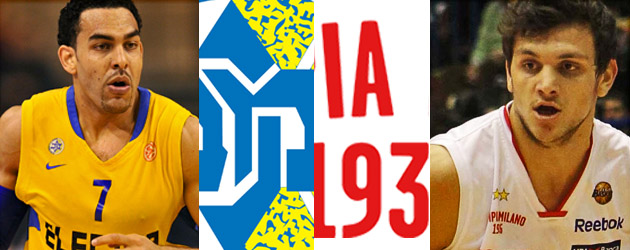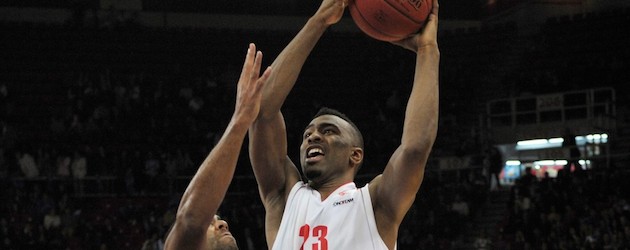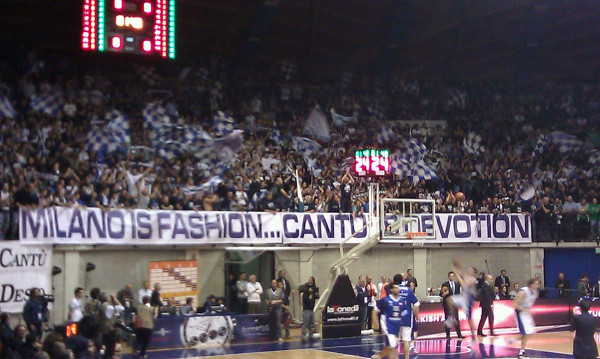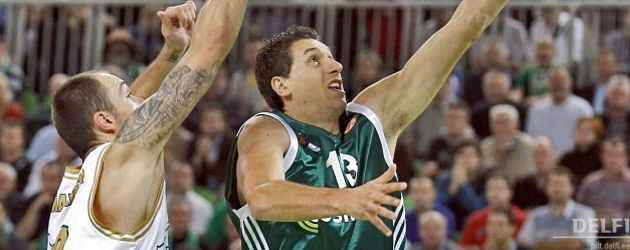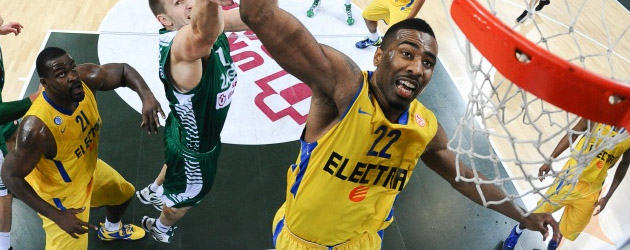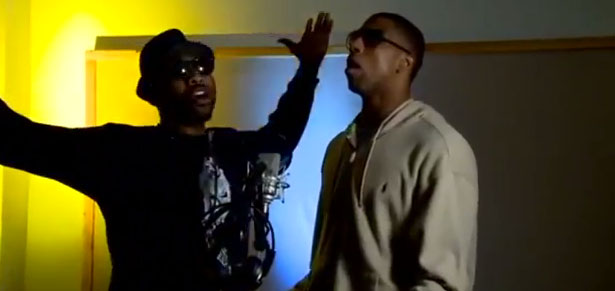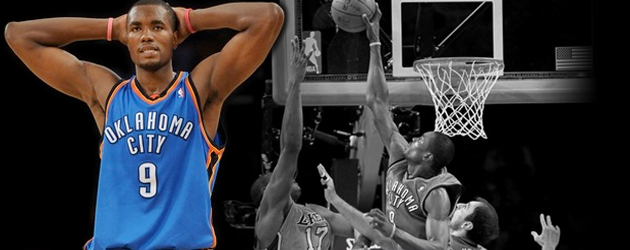By Nick Flynt / @JailedFlynt
С Рождеством, С Новым Годом, и т.д.
If I’m here wishing you seasonal greetings in Russian, it must be close to Top 16 time in Euroleague. And although the match was settled a week ago, I’d like to discuss the two non-CSKA Russian teams that had a chance to make the Top 16. Let’s take a look at the narrow victory that sent a Taylor Rochestie-less Nizhny Novgorod team in over a UNICS Kazan team that, from my perspective, was an unfun watch that shamed themselves and all of those who believed in them. Alright, that might be taking it a bit far, but I was hoping for more from UNICS.
By the numbers, this was a showdown between one team that was mediocre on both sides of the ball who were missing their best offensive player: Nizhny Novgorod. On the other side, UNICS, with an offense built around one-on-one playmaking that had been around average among Euroleague teams, and more notably with a defense that managed to hold things down pretty nicely (five or so points above average in the Euroleague Regular Season after all was said and done).
D’Or Fischer over the course of 10 rounds managed to turn back a pretty decent amount of shots (and he’d do it again against Nizhny, with five blocks), as he’s done in the past. An aside on that - I always thought of Fischer’s blocks as more of a showy stat than representative of how effective he really was on off-ball D, but I’m being forced to re-think this. He still has trouble against legitimate bigs because he can be moved around - Parakhouski in this game would have pretty decent effort on 5-of-10 shooting against UNICS, as an example. But let’s move along.
Here’s the match-up as it looked entering the game: This thing is win-or-go-to-Eurocup for both teams (UNICS could have qualified even with a loss if Zalgiris went down, but they managed a win). Nizhny Novgorod is at home but without its ball-dominating point guard who also happens to be scoring 20 per game in Euroleague play on 50% two and three point shooting, and UNICS has been, by the numbers, the stronger team to this point in almost every way. I was not confident in a competitive game going in - this despite a narrow win over Anadolu Efes for Nizhny in round nine (also without Rochestie), but that was a low-scoring slugfest in which Efes missed 13 free throws. Meanwhile UNICS rode in on a 4 game winning streak, with narrow wins over Efes and Dinamo Sassari, and big wins on the road against Real Madrid and at home against Zalgiris Kaunas. Earlier losses in the season were close misses against Madrid and Efes, and only a six point loss to Nizhny when they still had Rochestie. So UNICS really has a lot going for them here, if one was going to make a prediction.
Nizhny stuck with the starting lineup from their last game against Anadolu Efes, with Dmitriy Khvostov taking over as starting point guard, and Trey Thompkins moving to a sixth man role off the bench, with heretofore little-used Georgian forward Levan Patsatsia (he replaced Will Daniels after round two) taking over as starter. However, Thompkins would maintain his 25 minutes per game average and Patsatsia would only play 10.5 minutes, so let’s not make too much of this. UNICS had no changes to their usual setup — heavy minutes for starters Langford-Zisis-White-Kaimakoglou-Fischer, with guard Curtis Jerrells as the only bench player to get more than 10 minutes (he’d finish 10 seconds short of 19 minutes played) — filling in mainly for Zisis, or in the three-guard lineup sans White.
Solid defense on the season from UNICS or no, this would end up being an efficient scoring affair for Nizhny — around 116 points per 100 possessions. UNICS would end up at around 110 points per 100 (average for this Euroleague Regular Season was ~106). But this was while including about 12 combined points at the end of the game when both teams were handing out points via the foul/just-don’t-give-up-threes game. There was also a desperation 3 that fell for Jerrells that meant nothing (as the buzzer sounded it made it a 4 point game from 7). Things weren’t always sloppy, but they weren’t exactly clean either. Anyway, to the details.
UNICS, particularly early on, played a pretty aggressive defense, trapped a lot when possible against on-ball screens and forced some early turnovers (not usual for them this season, in terms of turnover production). After early jitters, though, Nizhny would settle in and end up with only nine turnovers on the night. After one quarter, things were going about as one might have predicted — 11 points scored for Nizhny on a lot of bad shots and an eight point lead for UNICS with Keith Langford hitting a few tough looks and generally easily penetrating and probing the lane, if not always with the result of a good look.
In the second period the offenses heated up some, and a couple of boneheaded plays to close the half by UNICS. A foul 30 feet from the basket led to Khvostov going 1-of-2 from the foul line, then a backcourt violation led to a drive and foul - two made free throws for Thompkins - meant instead of a 10 or 12 point lead for UNICS, Nizhny would trail going into halftime by only 7. In a game that would come down to the final minute, this was obviously big. Nizhny was still having occasional trouble on offense, but they showed a little more patience beating overextended UNICS D, and also simply hit a couple more open shots. Baburin and Khvostov helped make up for a 1-of-7 night from Antonov when all was said and done. On the other end, UNICS was getting the usual tough shots from Langford (and a few from Jerrells and James White) to fall. D’or Fischer had notably been quiet — middle pick-and-rolls with him setting screens allowed Parakhousi and co. to recover and force him to pass, or put up jumpers only over a strong contest. It might have been a better option to go to the side-pick-and-roll, or use him on the baseline and force his man to help on rolls. Either way, he was probably hit on the hand on one or two closeouts, and he earned a technical arguing as much.
In the second half, things would be similar, but another bad close to a quarter would put UNICS up against the wall, and from there so many Langford tough shots that had been going in would fail to fall, and Nizhny would end up advancing to the Top 16. I don’t want to breeze over the details of play too much, but really this was one of those games that goes to show you how much luck can play a part in these games — for every solid defensive play leading to a runout basket, or series of three or four passes leading to an open look, there were quite a few of these carrying UNICS’s offense:
And when those weren’t going down, it seemed like Nizhny got their share of lucky breaks, or if not that then UNICS was handing out a few points here or there at the end of quarters (as mentioned) through bad fouls or a careless turnover or two. This play is a great example of pretty good hustle on defense, but no one put a body underneath on Antonov. A combination of luck and lack of attention to detail that hurt UNICS in a tight game:
And sometimes there’s just a flat-out bailout shot that falls: here’s Khvostov, who had a pretty good game even if it’s obviously not possible to replace Rochestie’s offense.
As expected, Thompkins (17 points on 17 plays) and Tarence Kinsey (23 points on 18 plays) were asked to shoulder the offensive load. Kinsey did some solid work breaking down the defense, either looking to drive on Kaimakoglou or working against the smaller Langford at times and shooting over the top.
Anyway, you get the idea. Nizhny slipped into the Top 16 with a four point win over UNICS Kazan. Rochestie should be back by their first game against Milan, but who knows how close to one hundred per cent he’ll be. That means even more pressure on Trey Thompkins and Tarence Kinsey (and maybe a return to notability for a struggling Semyon Antonov), and while both played well against UNICS and have done well offensively on the season, obviously Nizhny is going to need Rochestie at a high level if they want to be close to competitive in the Top 16.
As for UNICS, I can only imagine the damage Fischer (13.1 points per game — he scored an astronomical 1.30 PPP in Euroleague. So far this year he has been the midrange shooter’s answer to Steph Curry) and Langford are going to do against even upper level Eurocup competition. Unless of course they continue to lean too heavily on Langford and start to suffer similar beatings as the one they were handed by Khimki in VTB league play on December 22nd (80-56 on the road).
And that does it for this update. Next time around we’ll take a look at how CSKA and Nizhny are managing in the Top-16.
